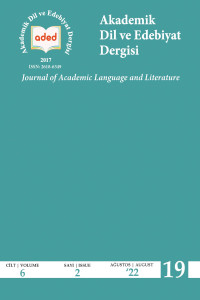Öz
Zaman kavramı, üzerinde en çok düşünülen ancak tam olarak bir tanımı yapılamayan, yapılan tanımların hiçbirinin genel kabul görmediği bir olgudur. Öznel, nesnel, toplumsal ve sosyolojik zaman olarak çeşitli tasniflere tâbi tutulan zamanın toplumlar için farklı zihniyetlerin tezahürü olduğu görülür. Doğu ve Batı toplumlarının zaman algılarındaki farklılık da bu bağlamda değerlendirilir. Nitekim Doğu için zaman bir döngüsellik ifade ederken Batı, zamanı çizgisel olarak algılar.
Türk toplumunda zaman algısı Tanzimat'la birlikte değişmeye başlamıştır. Osmanlı toplumunun Batılılaşma arzusu zaman algısını da etkilemiştir. Döngüsel zaman anlayışı yerini yavaş yavaş süreklilik ifade eden Batı algısına bırakmıştır. Türk edebiyatında Edebiyat-ı Cedîde adıyla bir döneme damgasını vuran bir edebî anlayış içerisinde adını zikrettiğimiz Tevfik Fikret'in zaman algısının da Tanzimat'la başlayan değişimden nasiplendiğini söylemek mümkündür. Onun şiirlerinde zaman sorunsalı sıklıkla karşımıza çıkar. Tevfik Fikret'in zamanı algılayışında; sanat anlayışı, yaşadığı dönem ve yetiştiği geleneksel kültürün izlerini sürmek mümkündür.
Bu çalışmada Tevfik Fikret'in Rübâb-ı Şikeste adlı kitabındaki şiirlerde geçen sabah vakti ve bu vakti ifade için kullanılan benzer kelime ve kelime gruplarından hareketle şairin zaman algısı üzerinde durulmak istenmiştir. Bu bağlamda Rübâb-ı Şikeste taranmış; fecir, sabah, subh, seher ve tulû kelimeleriyle oluşturulan tamlama ve imajlar tespit edilmiştir. Tespit edilen kullanımlardan hareketle şair için sabah vaktinin ne ifade ettiği, Tevfik Fikret'in anlam ve imaj dünyasında sabah vaktinin nasıl algılandığı ortaya çıkarılmak istenmiştir.
Anahtar Kelimeler
Tevfik Fikret şiir sabah vakti seher fecir. Anahtar Kelimeler: Türk edebiyatı, Tevfik Fikret, şiir, sabah vakti, seher, fecir.
Kaynakça
- Akarsu, B. (1998). Felsefe terimleri sözlüğü. İnkılap Kitabevi.
- Akay, H. (1998). Servet-i fünun şiir estetiği. Kitabevi.
- Han, B.(2019). Zamanın kokusu. Metis Yayınları.
- Kaplan, M.(1998). Tevfik Fikret. Dergâh Yayınları.
- Kubbealti Lugati (lugatim.com) (20 Temmuz 2022 tarihinde erişilmiştir.)
- Okay, O. (1990). Sanat ve edebiyat yazıları. Dergâh Yayınları.
- Polat, N. H. (2021). Tevfik Fikret bütün eserleri eleştirel basım. Yapı Kredi Yayınları.
- Şengül, M. B.(2015). "Rübâb-ı Şikeste'de zaman". Turkish Studies, Volume 10/16 Fall 2015, s. 1043-1060.
- Tanpınar, A. H. (2000). Edebiyat üzerine makaleler. Dergâh Yayınları.
- Uçan, Hilmi (2018). Batı şiiri ve Tevfik Fikret. İz Yayıncılık.
- Wıttmann, M. (2018): Hissedilen zaman. Metis Yayınları.
- Yuva, H. (2009): "Türk şiirinde zaman teminin değişimi". Turkish Studies, Volume 4 /1-II Winter 2009, s. 1653-1717.
- Yüksel, S. (2015). "Tevfik Fikret’in şiirlerinde duyguların “müşahhas çehre” olarak tasviri". Yeni Türk Edebiyatı Dergisi, S. 12, Ekim 2015, s. 187-197.
Öz
The concept of time is a phenomenon that is mostly thought about but cannot be fully defined, and none of the definitions are generally accepted. It is seen that time, which is subject to various classifications as subjective, objective, social and sociological time, is the manifestation of different mentalities for societies. The difference in time perceptions of Eastern and Western societies is also evaluated in this context. As a matter of fact, while time expresses a cyclicity for the East, the West perceives time as linear.
The perception of time in Turkish society started to change with the Tanzimat. Ottoman society's desire for Westernization also affected the perception of time. The cyclical understanding of time has gradually left its place to the Western perception that expresses continuity. It is possible to say that Tevfik Fikret's perception of time, whose name we have mentioned within a literary understanding that left its mark on a period in Turkish literature with the name of Edebiyat-ı Cedîde, also benefited from the change that started with the Tanzimat. The problem of time is often encountered in his poems. In Tevfik Fikret's perception of time; it is possible to follow the traces of his understanding of art, the period in which he lived and the traditional culture he grew up in.
In this study, it is aimed to focus on the poet's perception of time based on the morning time in the poems in Tevfik Fikret's book Rübâb-ı Şikeste and the similar words and vocabulary used to express this time. In this context, it was scanned in Rübâb-ı Şikeste; dawn, morning and sunrise are determined by phrases and images. Based on the identified uses, it is aimed to reveal what morning time means to the poet and how morning time is perceived in Tevfik Fikret's world of meaning and image.
Anahtar Kelimeler
Turkish literature Tevfik Fikret poetry morning time daybreak dawn. Turkish literature, Tevfik Fikret, poetry, morning time, daybreak, dawn.
Kaynakça
- Akarsu, B. (1998). Felsefe terimleri sözlüğü. İnkılap Kitabevi.
- Akay, H. (1998). Servet-i fünun şiir estetiği. Kitabevi.
- Han, B.(2019). Zamanın kokusu. Metis Yayınları.
- Kaplan, M.(1998). Tevfik Fikret. Dergâh Yayınları.
- Kubbealti Lugati (lugatim.com) (20 Temmuz 2022 tarihinde erişilmiştir.)
- Okay, O. (1990). Sanat ve edebiyat yazıları. Dergâh Yayınları.
- Polat, N. H. (2021). Tevfik Fikret bütün eserleri eleştirel basım. Yapı Kredi Yayınları.
- Şengül, M. B.(2015). "Rübâb-ı Şikeste'de zaman". Turkish Studies, Volume 10/16 Fall 2015, s. 1043-1060.
- Tanpınar, A. H. (2000). Edebiyat üzerine makaleler. Dergâh Yayınları.
- Uçan, Hilmi (2018). Batı şiiri ve Tevfik Fikret. İz Yayıncılık.
- Wıttmann, M. (2018): Hissedilen zaman. Metis Yayınları.
- Yuva, H. (2009): "Türk şiirinde zaman teminin değişimi". Turkish Studies, Volume 4 /1-II Winter 2009, s. 1653-1717.
- Yüksel, S. (2015). "Tevfik Fikret’in şiirlerinde duyguların “müşahhas çehre” olarak tasviri". Yeni Türk Edebiyatı Dergisi, S. 12, Ekim 2015, s. 187-197.
Ayrıntılar
| Birincil Dil | Türkçe |
|---|---|
| Konular | Edebi Çalışmalar |
| Bölüm | Makaleler |
| Yazarlar | |
| Yayımlanma Tarihi | 30 Ağustos 2022 |
| Gönderilme Tarihi | 22 Temmuz 2022 |
| Kabul Tarihi | 18 Ağustos 2022 |
| Yayımlandığı Sayı | Yıl 2022 Cilt: 6 Sayı: 2 |
Cited By
Rübâb-ı Şikeste’de Kuş İmgesi
Selçuk Üniversitesi Türkiyat Araştırmaları Dergisi
https://doi.org/10.21563/sutad.1303117
This work is licensed under Attribution-NonCommercial 4.0 International

